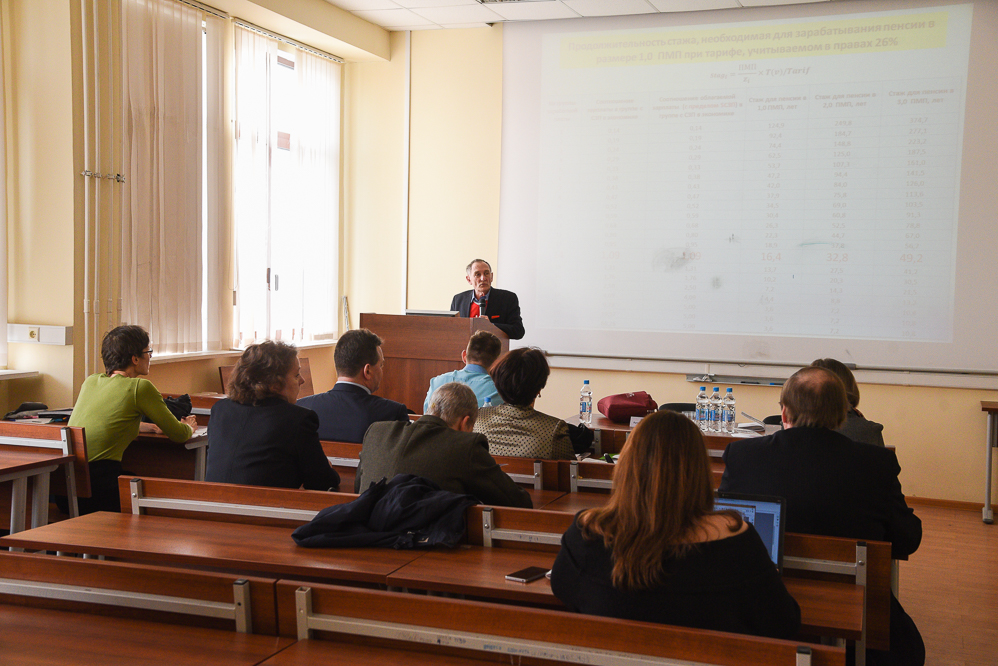
Published: March 31st, 2017
On the second day of the Moscow Economic Forum (MEF), on March 31, a roundtable on "Raising the Pension Age in Russia: Problems and Solutions. Are there any alternatives? ". During the discussion, experts discussed this topic, which is of great concern to Russian society.
The participants of the round table were Eduard Vafin, the manager of the Pension Fund for the Republic of Tatarstan, Professor Elvira Tuchkova, Doctor of Legal Sciences, Elena Bibikova, member of the Federation Council Committee on Social Policy, Konstantin Dobromyslov, the Head of the Department for Social Development of the FNPR Office, the Deputy Governor of the Pension Fund of the Russian Federation for the Ivanovo Region Vyacheslav Oikin and many others.
The moderator of the discussion was the Head of the Department of Actuarial Settlements and Strategic Planning of the Pension Fund, Professor of the Financial University under the Government of the Russian Federation Arkady Solovyov.
In his opinion, the low income of the bulk of Russians is a big problem. This is followed by extremely small contributions to the pension fund. Therefore, Arkady Solovyev stressed, even if people are forced to work for a few years longer and at the same time do not change insurance rates or other financial instruments, the state will not receive any economic benefit from raising the retirement age. The economist believes that it is possible to secure the pension obligations of the current period only at a tariff rate of 38%. The estimated savings on pension payments by his calculations are overestimated by at least 6 times.
The main problem of increasing age is the problem of coverage. Up to 65 years, only 4 out of 10 men survive, while women have a very low duration of healthy life. All the talk about raising the overall life expectancy as a factor in raising the retirement age is erroneous, since this indicator is reduced in many respects by reducing infant mortality and mortality in working age, the age of survival has not changed for about 100 years. Unreasonable increase in retirement age will endanger the entire insurance system.
"Retirement age is not a source of savings and should not be seen as an instrument for regulating budget expenditures. It is a parametric characteristic of the pension system. But under existing conditions, it can only be touched with other macroeconomic indicators, "the speaker concluded..
Head of the Department of the Federation of Independent Trade Unions of Russia Konstantin Dobromyslov shared the results of the research of pension systems: "In all countries, the accumulation systems have proved ineffective," the speaker is convinced. Absence of investment projects and tools that would allow investing this money and getting profit, making accumulation meaningless. Money simply has nowhere to invest, resulting in financial fraud, and inflation of financial bubbles, which from time to time crumble. Thus, all countries that have passed the experience of funded insurance return to the distribution system. However, the latter is not a panacea. Given the current and prospective change in the structure of employment worldwide and the reduction in the total number of people engaged in productive work, the entire system of social insurance, including pension insurance, needs to be revised. Perhaps, the result will be a system of guaranteed incomes with additional payments, but now, according to the speaker, there is no single opinion on the principles of redistribution of national wealth.
Doctor of Economics, Professor Lyudmila Rzhanitsyna began her speech with a call to look at the pensioner in a comprehensive manner, and not only as part of the pension system. "The pensioner's budget today is only 35% of the pension," she said, "the rest is earnings, help from children, subsidiary farming, and so on." Rzhanitsyna does not approve of a new approach to social policy, which takes into account property security. She is convinced that pensioners, as the most financially secured people, will suffer greatly. Already, with the existing substitution factor, in Moscow, the pension of 13,000 - 14,000 rubles, which has remained unchanged for several years, with the current price increase is an unthinkable amount. Parallel to this, according to Rzhanitsyna, "there is a rout of social policy at the regional level".
As a solution, the economist suggested studying the situation of pensioners with the subsequent alignment of the program-target budget of the pensioner.
Participants in the discussion unanimously believe that raising the retirement age is permissible only when reforming the entire system. Now, the state's task is to act systematically, constantly monitoring the number of new jobs for young professionals and the corresponding conditions in the labor market.
Latest news
07.05.2018 MEF-2018: debate "Cultural policy: between individual freedom and the interests of society?"
07.05.2018 MEF-2018: Conference No. 8
07.05.2018 MEF-2018: Conference No. 4
07.05.2018 MEF-2018: Conference No.3
07.05.2018 MEF-2018: Conference No. 2
07.05.2018 MEF-2018: Conference No.1
26.04.2018 McConnell Discusses Information Warfare
20.04.2018 MEF-2018: closing plenary session
17.04.2018 Mr. Freysinger: «Skripal’s case» for relationship between Russia und European Union?
